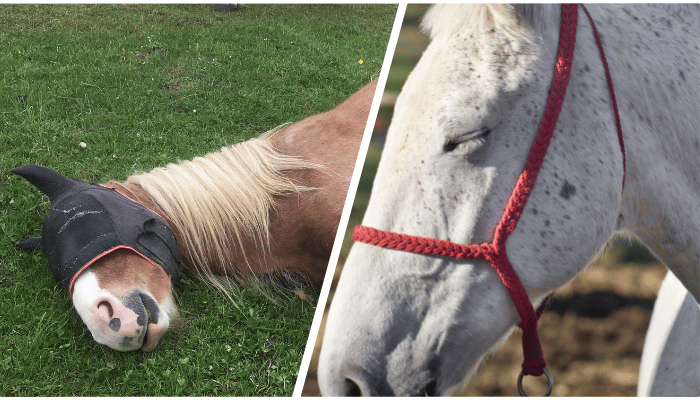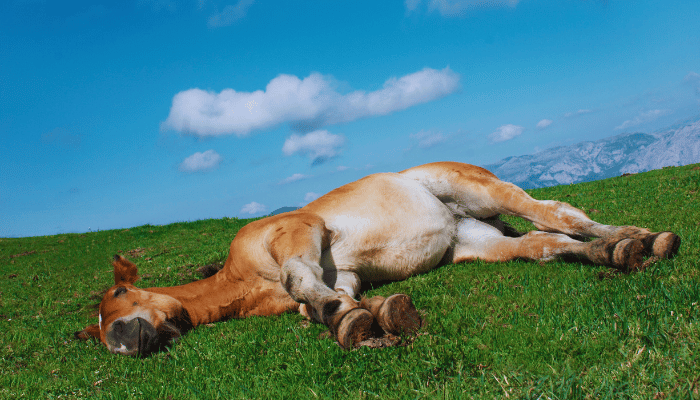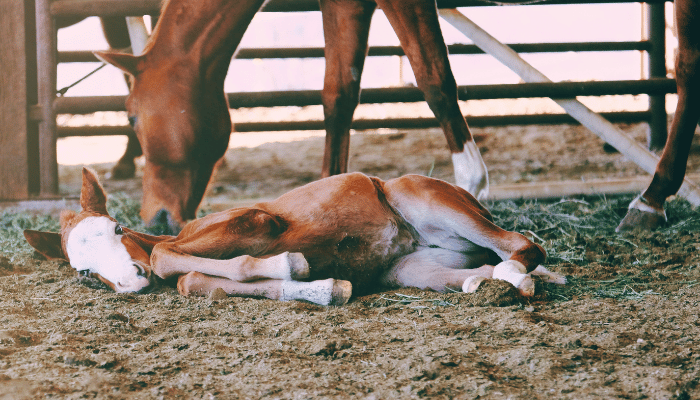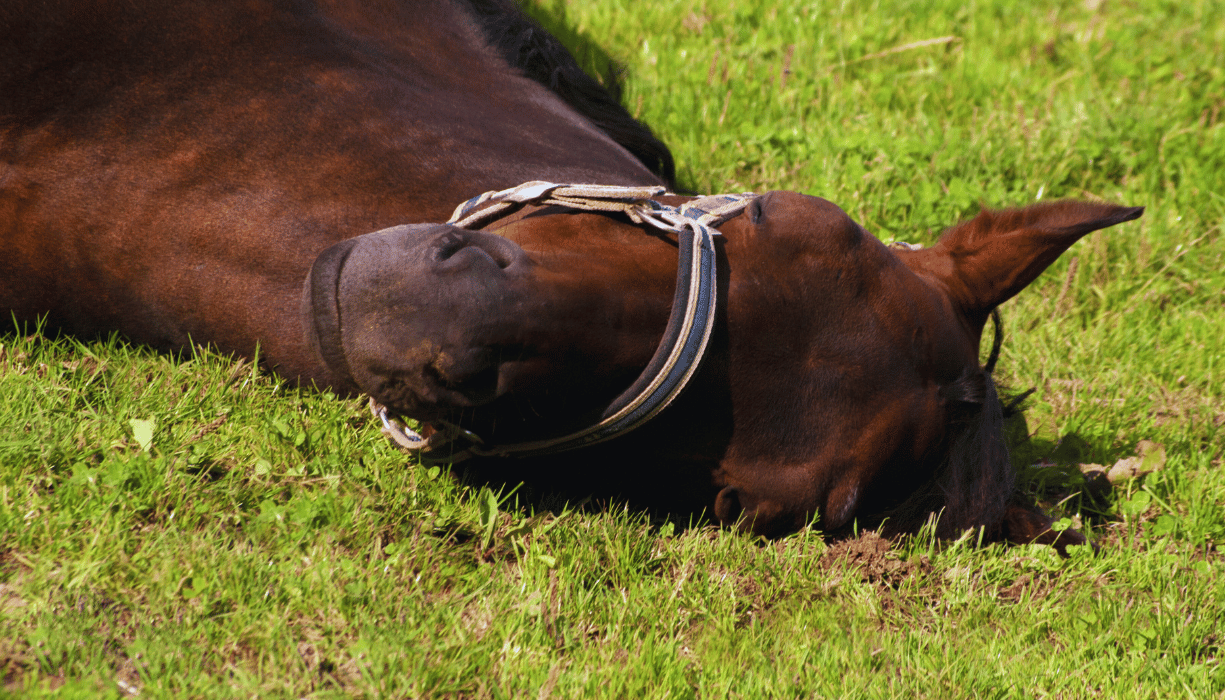When you spot a horse lying down, you might wonder, “Do horses sleep lying down?” The sight can be surprising, as these majestic animals are often associated with standing tall, even while resting. But here’s the intriguing truth: while horses can doze on their feet, lying down is essential for their overall well-being. Without it, they can’t achieve the deep, REM sleep crucial for their health.
Does this mean your horse spends hours stretched out? Not quite. Horses have evolved to balance safety with slumber, limiting the time they lie down to short, vital intervals. If your horse seems reluctant to lie down, it could signal discomfort or environmental stress.
In this guide, we’ll explore the fascinating rest patterns of horses, explain why lying down is so important, and offer insights to help create a safe, comfortable space for your equine companion to rest peacefully.
Horse Sleeping Habits
Understanding the sleeping habits of horses is fascinating and vital for their care. Let’s explore how horses rest, including the differences between standing and lying down and the importance of REM sleep.

Standing vs. Lying Down
Horses have a unique ability to sleep while standing. This adaptation is primarily due to their evolution as prey animals, allowing them to quickly escape from predators if necessary. The anatomical feature known as the “stay apparatus,” which includes specialized tendons and ligaments, helps stabilize their joints. This allows them to relax their leg muscles with minimal effort, enabling a standing sleep.
Despite their ability to sleep standing up, horses also need to lie down to achieve complete rest. They require at least 25 minutes of REM sleep per day, which can only occur when they are in a lateral recumbent position (Mad Barn).
Importance of REM Sleep
REM (rapid eye movement) sleep is essential for horses’ overall health and well-being. During this stage, brain cell regeneration, memory consolidation, and mental health processes occur. Foals require more REM sleep than adult horses, and it constitutes about 20% of their total sleep time (Equishop).
Lack of adequate REM sleep can negatively impact a horse’s quality of life. Increased susceptibility to injuries such as falling, tiredness, irritability, and a higher risk of diseases can arise from sleep deprivation.
Here’s a summarized view of sleep patterns in horses:
| Sleep State | Description | Criticality for Health |
|---|---|---|
| Standing Sleep | Facilitated by the “stay apparatus,” allowing minimal muscle tension | Low |
| Lying Down (Non-REM) | General rest, muscles fully relaxed | Moderate |
| Lying Down (REM) | Essential for brain cell regeneration, memory consolidation | High |
For more in-depth information on related topics, consider exploring our articles on do horses sleep standing up and do horses sleep lying down. These resources provide additional insights into the fascinating world of horse sleep patterns.
Factors Affecting Horse Sleep

Understanding the factors that influence horse sleep is crucial for ensuring their well-being. Both anatomical adaptations and environmental influences play significant roles in shaping their sleep patterns.
Anatomical Adaptations
Horses possess unique anatomical features that allow them to rest while standing. One such feature is the “stay apparatus,” a system of tendons and ligaments that helps stabilize their joints when they relax their leg muscles. This mechanism enables horses to sleep standing up with minimal muscle tension.
Horses can doze in a standing position due to the stay apparatus in both the front and hind limbs, which allows their legs to “lock” in place. However, they must lie down to enter deeper sleep states, such as Rapid Eye Movement (REM) sleep. During REM sleep, a horse’s muscles fully relax, and this stage is essential for their mental, emotional, and physical health.
| Sleep Type | Position | Function |
|---|---|---|
| Light Sleep | Standing | Rest and drowsing |
| REM Sleep | Lying Down | Deep, restorative sleep |
Environmental Influences
The environment plays a critical role in a horse’s ability to sleep properly. Several factors, such as the availability of suitable resting areas, social environment, and physical comfort, can influence a horse’s sleep patterns. For example, unsuitable environmental conditions or social insecurity can limit a horse’s ability to lie down, leading to REM deficiency and excessive drowsiness.
To ensure that horses get adequate sleep, it is essential to provide a safe, comfortable, and quiet environment. This can include:
- Clean Bedding: Ensure that the bedding is clean and comfortable to encourage the horse to lie down.
- Stable Companionship: Social animals like horses feel more secure when they have stable companionship.
- Minimized Noise: Reduce loud noises that might startle the horse and disrupt its sleep.
More insights on managing these factors can be found in our section on management practices.
By considering both anatomical and environmental factors, horse owners can better understand and support their horse’s sleep patterns. For additional information on sleep-related behavior, explore topics like can horses sleep standing up and do horses sleep lying down.
Observing and Addressing Sleep Patterns

Normal Variations
Horses exhibit various sleep patterns characterized by multiple, discrete sleep episodes throughout the day. These episodes, known as polyphasic sleep, can include both standing and lying down postures. Typically, horses spend one to three hours in a 24-hour period lying down in either sternal (upright) or lateral (flat on side) recumbency. Foals, on the other hand, tend to spend more time lying down compared to adult horses, but this behavior decreases as they grow older.
Different factors influence how much time a horse spends lying down, including feeding schedules, turnout management, and age. Horses in constant turnout, for instance, tend to lie down less frequently. Observing and understanding these variations is important for detecting any abnormal patterns.
| Age Group | Time Lying Down |
|---|---|
| Foals | 4 – 6 hours |
| Adult Horses | 1 – 3 hours |
Management Practices
Identifying and addressing management practices that impact sleep quality is crucial for ensuring your horse gets sufficient rest. Here are some effective strategies to promote healthy sleep patterns:
Turnout Management: Provide adequate turnout time but ensure your horse has opportunities to lie down without feeling vulnerable. A constant but safe environment can encourage appropriate rest.
Feeding Practices: Monitor feeding schedules and make necessary adjustments to promote better sleep. Horses should have access to nutrition that reduces inflammation, especially senior horses who may have mobility issues. Consider adding omega-3 fatty acids and supplements like hyaluronic acid, chondroitin sulfate, glucosamine, and manganese sulfate to their diet.
Social Stability: Horses are social animals, and changes in herd dynamics can disrupt sleep patterns. Maintaining a stable social environment is critical in allowing horses to feel secure enough to achieve optimal rest (Veterinary Practice).
Environmental Control: Manage environmental stressors like extreme temperatures, unfamiliar surroundings, and inappropriate housing. Ensuring a comfortable and familiar sleeping area can mitigate stress.
Body Condition Monitoring: Overweight horses can face difficulties lying down and rising, reducing their ability to enter REM sleep. Keeping horses in an appropriate body condition is vital for facilitating ease of movement and proper sleep.
By paying close attention to your horse’s sleeping habits and addressing any issues that arise, you can help ensure they receive the rest they need. For more detailed insights, visit our resources on do horse sleep lying down and do horses get tired of standing.
Sleep Deprivation Risks
Causes and Effects
Horses must lie down to enter a stage of deep sleep known as paradoxical or REM (Rapid Eye Movement) sleep. Inadequate sleep can occur when a horse cannot or is unwilling to lie down, leading to serious sleep deprivation. Key causes include:
- Pain and Illness: Physical discomfort can inhibit a horse’s willingness to lie down.
- Management Inadequacies: Inadequate management practices or unsuitable living conditions can create an environment that discourages rest (Veterinary Practice).
- Ethological Needs: Unmet behavioral needs, such as sufficient social interaction, can affect sleep patterns.
- Environmental Stressors: Busy, stressful, or unfamiliar environments – such as during competitions or hospital stays – can disrupt a horse’s routine.
Recumbent sleep deprivation can lead to various health issues, including:
| Effect | Description |
|---|---|
| Injuries | Over 90% of horses suffering from sleep deprivation experience injuries on knees, fetlocks, head, and hocks. |
| Reduced Immune Function | Lack of proper sleep can weaken the immune system, making horses more susceptible to illnesses. |
| Behavioral Issues | Sleep-deprived horses can exhibit changes in behavior, such as increased irritability and decreased performance abilities. |
Mitigation Strategies
To mitigate sleep deprivation and its associated risks, it’s essential to create an environment that encourages healthy sleep patterns. Here are some strategies:
- Pain Management: Ensure regular veterinary check-ups to address and manage any pain or physical discomfort. Proper treatment can make it easier for horses to lie down and rest.
- Suitable Living Conditions: Provide appropriate housing, ensuring a comfortable and stress-free environment. This includes proper bedding and space to move freely.
- Meeting Social Needs: Horses are social animals. Ensure they have adequate social interaction to meet their ethological needs.
- Stability in Herd Dynamics: Monitor and manage changes in the herd to prevent disruptions that can affect the sleep of individual horses.
- Environmental Control: Minimize environmental stressors by providing a quiet, familiar space, especially during competitions or hospital stays. Maintain a stable temperature and limit disturbances.
For more on the importance of creating a conducive environment for your horse’s sleep, check out our articles on do horses sleep standing up and can horse see in the dark.
By understanding the causes and effects of sleep deprivation and implementing effective mitigation strategies, horse owners can enhance their horse’s overall well-being and quality of life.

